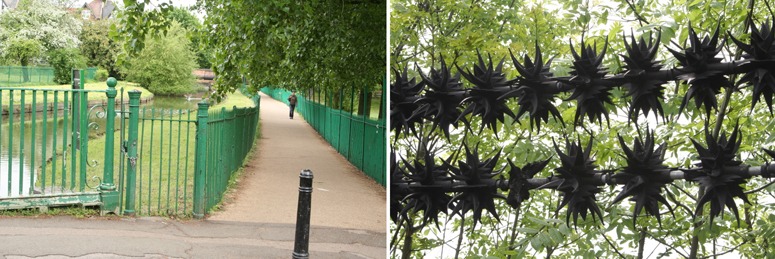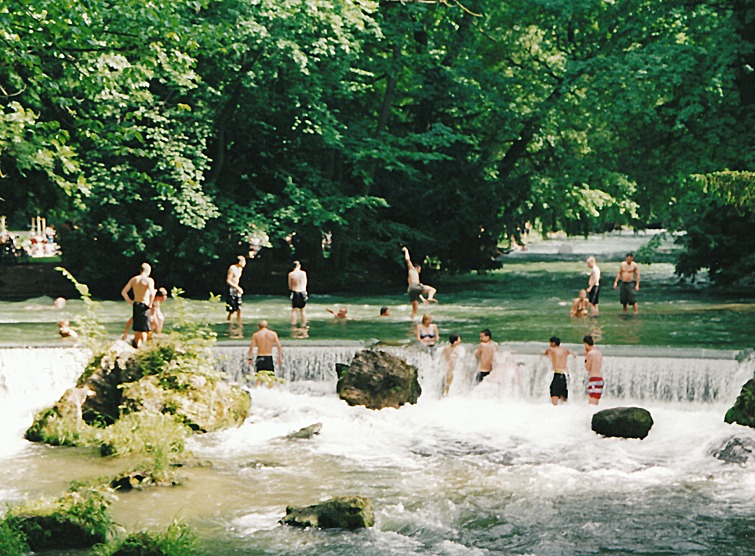Here are two great ideas for protecting the public from the natural hazards of life in parks. The left photograph is of the New River. It is more than 150mm deep and therefore a considerable risk to public health and safety. Trees can also be very dangerous if one tries to climb them and one has an accident. Thank goodness for London’s vigilant park managers. Sadly, the Germans have no idea how to protect the public from danger. As the below photograph shows, Germany has so much to learn from England. We hope and expect that the 2012 London Olympic Park will show how the 1972 Munich Olympiapark should have been designed. It was such a good idea to assess the quality of English landscape design – and then hire an American landscape architect to oversee the project. The Germans had to make do with local talent back in ’72. Phew. And isn’t it disgusting that nudity is permitted in German parks? One might as well start putting beer gardens in parks and allow people to have BBQs and eat sausages. It makes one so proud to be unenlightened – but I am not that “one”.
.



Is all this insanity Tom has highlighted something to do with inane court cases where the law seems to encourage the British citizen to divest themselves of personal responsibility. I suspect the Insurers to the premises owners are keen to avoid paying out ludicrous payments for some stupid judgement that renders them liable, hence the prison like safety measures.
Could not a simple and large sign saying ‘Danger-entering the deep water and/or climbing trees is hazardous- you could kill or hurt yourself. Your shout ..CHUM.’
Can we trace this back to national philosophical differences? On the one hand we have Wordsworth with his – to me, prissy – “Host of Golden Daffodils”, on the other we have the “Blut and Boden” (blood and soil) of the German National Romantics (and that was before the National Socialist movement…). I don’t have much to back this up, but I can attest that the physicality with which the German people respond to their parkland – and landscape – environments has an animal sensuality almost completely lacking in their English counterparts. Perhaps both countries are receiving the park landscapes that their inner spirit yearns for?
Thank you for two interesting observations. I’d like to know of more examples of the British lack of personal responsibility and the Germans animal sensuality in responding to parks.
I don’t see why I should be fair about the above photographs, but there are explanations – to be fair: (1) the fencing round the New River was installed when it was a significant part of London’s water supply and when water treatment was not the science it is today. The land probably still belongs to Thames Water which is now owned by a company which is not famed for its enlightened public-spiritedness: Macquarie Bank (2) I think the anti-child device is intended to discourage children from climbing a parapet wall and throwing themselves onto a railway line.
Hmmm the issue of water pollution and waterside living and water recreation is a complex one. Artwork is always a good way to break open the issues….
[ http://www.brokencitylab.org/blog/anne-percocos-indras-cloud/ ]
By the standards of the Yamuna, there is no such thing as a polluted river in Europe, America or Australia. It is 101% effluent and looks like sump oil.
Tom, Here is another image of German Animal Sensuality, from the 1925 film “Wege zu Kraft und Schoenheit” (“Ways to Strength and Beauty”). It is a famous image, part of Germany’s cultural heritage:
http://bp1.blogger.com/_VGMsZBdykrk/SIXm2Z3hRaI/AAAAAAAADiE/-RVch89Ensg/s1600-h/Wege1.jpg
The family version of this was the currency of the 1980’s:
http://commons.wikimedia.org/wiki/File:Bundesarchiv_Bild_183-1983-0804-409,_Kreis_Angerm%C3%BCnde,_FKK-Strand.jpg
And the empowered, single modern woman carries the comtemporary flag:
http://commons.wikimedia.org/wiki/File:FKK-Gelande_Sudstrand_(2201433120).jpg
I believe that the German yearning for nature in nature stems from a deep, physical connection to the landscape, perhaps unique to that country:
http://germannews.info/odd/3106.html
In a country where such a broad segment of the population think and feel this way, it is easier for politicians to score votes by campaigning to remove such things as the Finsbury Park caged stream, that is, if they get built in the first place. Perhaps in this way, every society does get the landscapes it wants and needs. Can it be that some societies simply put a higher value on the quality of their open space than others? Or have a deeper relationship with it?
Ah – I get the idea! I believe the first written account of the Germans comes from Tacitus. He wrote
“In their ancient songs, their only way of remembering or recording the past, they celebrate an earth-born god, Tuisco, and his son Mannus, as the origin of their race, as their founders… All have fierce blue eyes, red hair, huge frames, fit only for a sudden exertion… Their country, though somewhat various in appearance, yet generally either bristles with forests or reeks with swamps; it is more rainy on the side of Gaul, bleaker on that of Noricum and Pannonia…..
Tradition says that armies already wavering and giving way have been rallied by women who, with earnest entreaties and bosoms laid bare, have vividly represented the horrors of captivity, which the Germans fear with such extreme dread on behalf of their women, that the strongest tie by which a state can be bound is the being required to give, among the number of hostages, maidens of noble birth. They even believe that the sex has a certain sanctity and prescience, and they do not despise their counsels, or make light of their answers.”
But this is just as much an account of the Anglo-Saxon strain in Britain as it is of Germany.
I do enjoy your blog tremendously and I read it often. It’s amusing, and pretty hypocritical, that you, “find it disgusting that nudity is permitted in German parks”, yet two posts before there is no problem with having a photo of a naked woman entering the water, or as you put it, “A brave girl going for a swim in the River Thames…”. So, which side of the fence are you on? Keep up the interesting work!
I think the German approach is sensible and liberal. People should be allowed to disrobe but should have the good manners not to do so near people who would be offended. The brave girl was, I believe, topless but not bottomless – which is another good compromise.
There are many people turn up and barbecue in my local park during the summer and no-one would mind if they took their rubbish away with them! Since so many didn’t the park became littered with yellow signs saying…no barbecues…no…and a very long list, I care not to remember.
You think we suffer with Health and Safety in parks compared to Germany, but what about schools. Our head thinks you need to pad the columns on a nursery canopy in case children run into them.
In Germany they would build some proper BBQ stands – with good litter bins nearby.
In Australia they would also supply butane gas to the BBQ stands with a meter to let you pay by the hour – with good litter bins nearby.
In the UK I doubt if health and safety is nearly as serious a problem as bad park managers. Most come from a horticultural background and lack either the design judgment or the people-management skills to run a park. It is like having a railway system run by the cleaning staff, or, British Airways might say, an airline run by its cabin staff.
Should we consider the culture of indoor and outdoor bathing separately? Or do you believe their is some intrinsic connection? Michelle Facos writing in ‘Water, leisure and culture: European Historical Perspectives’ charts the rise in popularity of Bathing in Sweden during the late nineteenth and early twentieth centuries noting(p105);
“All varieties of bathing were practised – indoor and outdoor, customed and nude, hygenic and recreational.”
My guess is that whatever bathing was done in Neolithic times took place naked and out of doors. Indoor bathing must then have been a luxury enjoyed first in palaces and later in public bath houses. I think the Romans discouraged mixed bathing (eg in the Baths of Caracalla) but that it none the less took place.
Perhaps so? Do you believe bathing belonged to the secular or sacred realm? Do you mean naked in the sense of ‘unclothed’ or naked in the sense that an indigenous person may have minimal body coverage as a rule?[ http://alphabet-city.org/issues/water/articles/the-public-bath-and-the-city ]
It’s hard to know where to look in seeking answers to these questions so I can only offer valueless guesses. Re the sacred or secular question, my guess is that the separation was less sharp than it later became and that since the Nile was closely associated with Hapi and other gods, there was a ritual aspect to all washing. Re nudity, paintings indicate that it was not taboo and so I would guess people undressed in order to wash – and were much less bashfull than we are.
I would agree that the distinctions between the secular and the sacred were probably not as sharp as we experience them today.
In 1916 children certainly bathed naked and out of doors in Australia.
[ http://www.museumsaustralia.org.au/site/A%20feast%20of%20photography.php ]
It is highly probable that adults bathed naked and out of doors in Australia too.
[ http://gutenberg.net.au/ebooks09/0900091h.html ]
Brilliant to see your post, Tom. Thank you. I have been going on about this no BBQ issue for years and have been hit by the reality recently. While trying to organise a charity cycle ride and outdoor BBQ, it is proving most difficult to find a venue. I have been told by the county council it is too dangerous because someone could “bump” into the BBQ and knock it over (we are talking about a large catering BBQ here).
As for the amenities in Germany, while I would agree one would find proper BBQ pits/stands and rubbish bins as mentioned in a previous post, also many Germans would issue a swift reminder should you forget to clean up – something which is not as likely to happen in Britain. There seems to be a bit of “volunteer policing” in Germany which we do not often find in this country.
There are so many beautiful places in the UK. I just wish we had the freedom to go out, have a BBQ, jump in the water if we want and enjoy what little bit of good weather we have — Not be constantly reminded that somehow we are incapable of demonstrating common sense.
What can be done?
I agree about NEED for freedom. But there is also a need for protection and I would argue for maintaining a distinction between bound and unbound public greenspace. Re BBQs and swimming in parks the possibilities are (1) lobby the local council (2) become the Chair of the Leisure Services Committee (3) write to the papers! (4) argue the case for landscape designers and landscape managers [instead of horticulturalists] to be placed in charge of parks (5) send all members of leisure services committees on world tours (6) launch a research study of park management in different countries (7) pray.